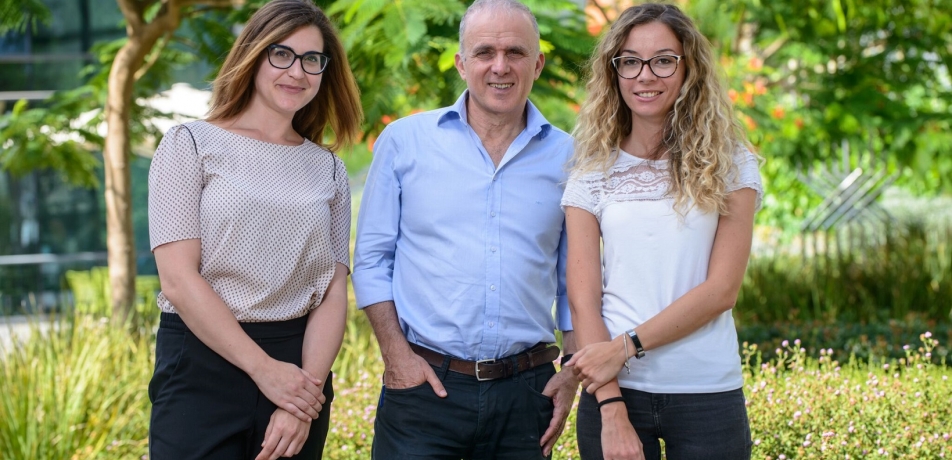Tackling lung cancer
New protocol blocks drug resistance, tumor regrowth
Features

L-R: Dr. Donatella Romaniello, Prof. Yossi Yarden, Dr. Ilaria Marrocco
Certified as a pharmacist in her native Italy before beginning her doctorate at Rome’s Sapienza University—where she concentrated on the biochemistry of cancer—postdoctoral fellow Dr. Donatella Romaniello already had the ideal background for research in cancer therapeutics. But it wasn’t until she spent a year as a visiting PhD student at New York’s Memorial Sloan-Kettering Cancer Center that she discovered the Sergio Lombroso Fellowship program, a donor-funded initiative that allows talented young researchers from Italy to continue their training at the Weizmann Institute.
Thanks to her Lombroso Fellowship, Dr. Romaniello was able to re-locate to Israel, and join the team of Prof. Yosef Yarden of the Department of Biological Regulation—a scientist whose cancer-related research, particularly in breast cancer, has already had a global impact.
Now, after just two years on campus, Dr. Romaniello has personally contributed to a discovery that may significantly improve drug protocols for the treatment of lung cancer. In findings published in May 2019 in the journal Clinical Cancer Research, Prof. Yarden, Dr. Romaniello, and their colleagues announced that they had identified a strategy for overcoming a tricky problem: the fact that many lung cancer patients, initially treated successfully, develop drug resistance and suffer from tumor regrowth. Also integral to the study was Dr. Ilaria Marrocco, another Lombroso scholar.
In the study—in which Dr. Romaniello appears as first author—the scientists concentrated on determining the most effective combination of clinically approved drugs that might overcome resistance to TKIs—pharmaceutical compounds that block the action of enzymes called tyrosine kinases. TKIs inhibit these enzymes, which are mutated, or appear at pathologically high levels in some types of tumors.
Oncologists prescribe TKIs to lung cancer patients whose tumors are characterized by a mutation in EGFR—a growth factor receptor that has been the focus of Prof. Yarden’s research for many years. In its mutated form, EGFR promotes cancer progression, but treatment with TKIs can cause lung cancer tumors shrink. However, the benefits are fleeting; after less than a year, new mutations or bypass mechanisms appear that cause the cancer to recur.
Looking for a way to prevent this type of cancer recurrence, the scientists turned to a selection of existing anti-cancer drugs known to block the EGFR family of receptors.
Based on models of both primary and metastatic lung cancer, they examined how these tumors responded to a combination of three clinically approved compounds—cetuximab (an antibody that targets EGFR), trastuzumab (an antibody that targets HER2, another member of the EGFR receptor family), and the TKI inhibitor osimertinib (in a low dose). They found that, when administered together, these compounds provide effective and long-lasting treatment that prevents the emergence of TKI resistance, forestalling tumor-regrowth. The results, verified both in animal models and in in vitro cell-based studies, demonstrate that this drug combination achieves simultaneous blockade of several well-characterized drug resistance mechanisms.
One of the most exciting aspects of the current study is the fact that one of the drugs used— trastuzumab—targets HER2. This is the same overexpressed receptor characteristic of “HER2 positive” breast cancer, a particularly aggressive and hard-to-treat tumor type. This indicates that the scientists’ combined-drug approach may eventually prove applicable to HER2 positive breast cancer as well.
These findings, demonstrated in a preclinical model, will eventually form the basis of clinical trials in human cancer patients.
From Italy to Israel
Dr. Romaniello is recipient of a Sergio Lombroso Fellowship in Cancer Research, a competitive award that enables outstanding Italian students to pursue their MSc, PhD, and postdoctoral training at the Weizmann Institute. After receiving the award, she was thrilled to be welcomed as a member of the lab of Prof. Yarden—with whose work she was already very familiar. Prof. Yarden is an Israel Prize laureate who has made significant contributions to the understanding of cancer, which have paved the way for new treatment protocols as well as several successful anti-cancer drugs.
“I had already known about Yossi’s discoveries related to EGFR—which have had a strong influence on the way doctors now treat a number of different cancer types,” says Dr. Romaniello. “It has been wonderful to experience what it like to do research here at the Weizmann Institute—it’s an amazing, and very supportive environment, full of people who share a passion for science.”
Prof. Yarden is supported by the Dwek Institute for Cancer Therapy Research, the David and Fela Shapell Family Foundation INCPM Fund for Preclinical Studies, the Moross Integrated Cancer Center, the Dr. Miriam and Sheldon G. Adelson Medical Research Foundation, the Willner Family Center for Vascular Biology, Rising Tide Foundation, Marvin Tanner Laboratory for Research on Cancer, Comisaroff Family Trust, Rachel and Shaul Peles fund for Hormone Research, and the European Research Council. Prof. Yarden is the incumbent of the Harold and Zelda Goldenberg Professorial Chair in Molecular Cell Biology.
Drs. Romaniello and Marrocco are funded by the Sergio Lombroso Fellowship.








